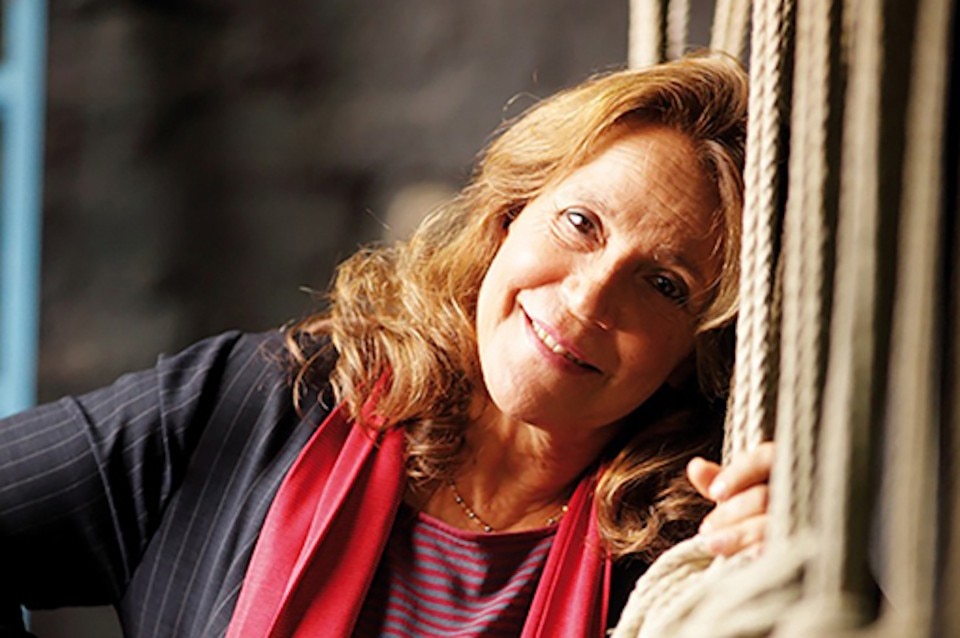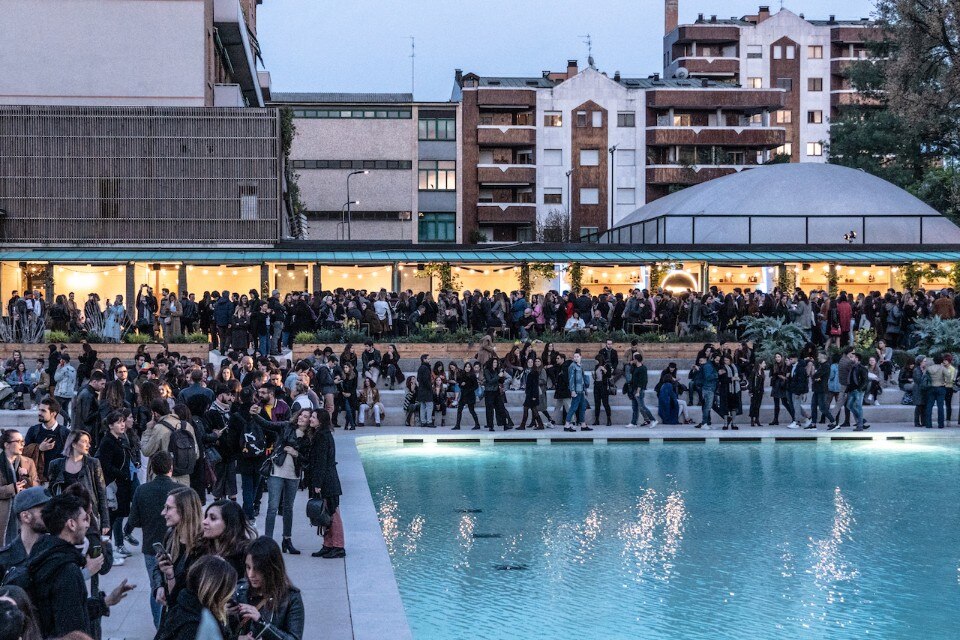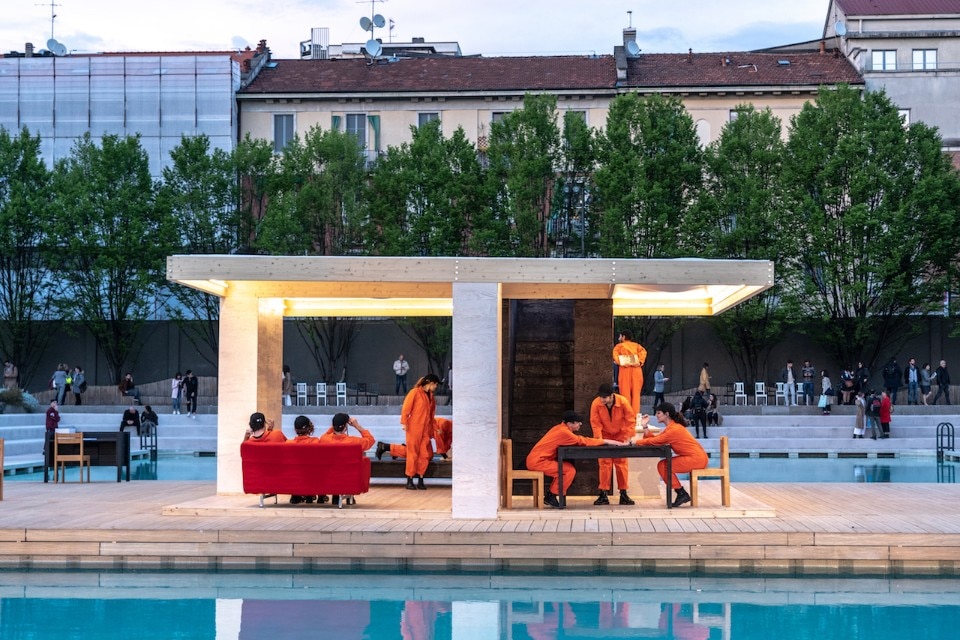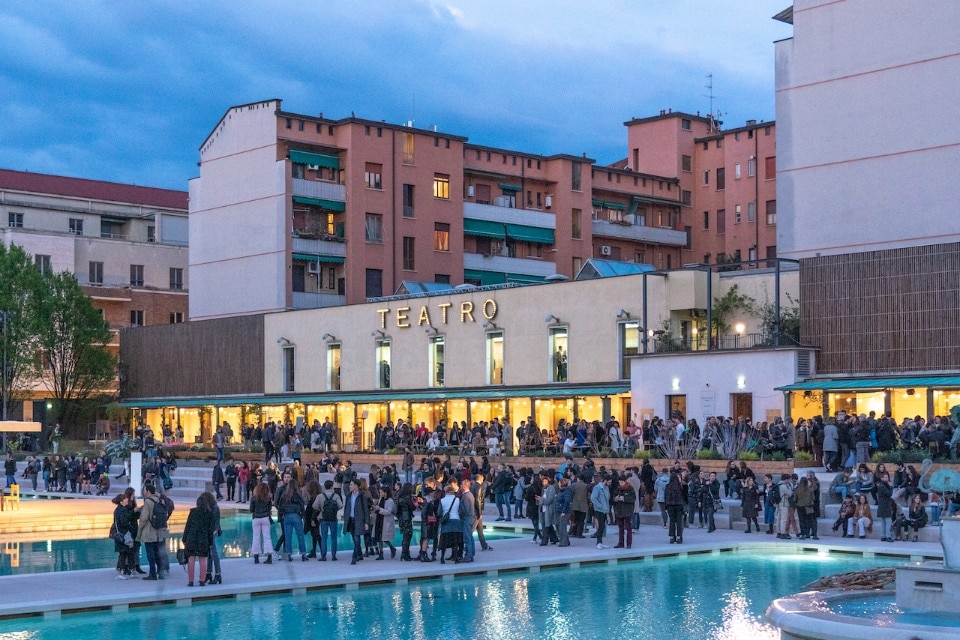“When we opened the theatre in 1972, in addition to Franco, Testori and Dante Isella there was Ripa di Meana. He was with Gae Aulenti. When we asked how to convert that former cinema into the place where we were going to live, she made us remove all the velvets and chose a colour to make it uniform, a kind of maroon-claret shade that remained until the first renovation in 89. Hers was the first gesture made in our theatre.
I say this to make it clear that the Milanese world I grew up in found the connections between the arts absolutely natural. Many people did a lot of different things, from Pier Luigi Cerri to Laura Alvini, who gave concerts and helped with the performances, and even later, Tadini who was a painter and writer, wrote articles in the Corriere and for the theatre.”
Milan and its great success, from the 70s to the present, has a secret. It was not a school, it was not an academy or a company. It was above all an existential condition.
Andrée Ruth Shammah is a river in spate, with an emotional vibrancy that lights up all the corners of her beautiful house, set in the historic heart of Brera, where every corner, every inch of wallpaper, every vase, every book, every photo, tells of an experience out of the ordinary. “Milan and its great success, from the 70s to the present, has a secret. It was not a school, it was not an academy or a company. It was above all an existential condition. Everyone explored their own way and their paths crossed, people met, they talked. They were all different and extraordinary subjects, cultured, intelligent, magnificent.”

This is the idea behind Parenti District Art & Design that Andrée decided to found by bringing together Milanese creativity in a project where objects speak because theatre is communication.” We thought: let's take all those who have their own opinion about the objects. Yesterday , for example, we invented a battle between chairs written by Pierluigi Cerri. One chair was very refined but expensive, because each piece had to fabricated in a thousand different stages, while the other was cheaper. That gave rise to the dialogue between the two chairs, one that says ‘But I don’t cost much’ and the other that says, ‘but cost means value’, and so forth. And you can by his eyes Cerri becoming a boy again.”
Born in Milan in 1948 to Jewish parents who used to live in Syria, after her experience as an assistant at the Piccolo Teatro di Milano, directed by Giorgio Strehler and Paolo Grassi, she founded the Salone Pier Lombardo in 1972, which later became the Teatro Franco Parenti, in memory of the great actor who has passed away. Appointed when she was very young by La Scala Opera House to direct Maurizio Kagel’s Variété and later L'elisir d'amore by Donizetti, Andrée Shammah has staged hundreds of shows, working with performers ranging from Adriana Asti to Giorgio Albertazzi, Luca De Filippo, Anna Galiena, Carlo Cecchi, Filippo Timi, Gioele Dix and has made the theatre she directs a nationally significant place of social focus and culture.
Behind creativity there has to be amusement, an emotion, an outlook that has nothing to do with financial profit.
If her thinking is strongly imbued with the values of Jewish culture, of which she is one of the most authoritative voices in Italy, Andrée remains a woman who knows how to enjoy herself and laugh, considering pleasure and feeling the secret of every creative act. “Behind creativity there has to be amusement, an emotion, an outlook that has nothing to do with financial profit. Over 10,000 people arrived at the opening of the Parenti District and I hope it will also prove an attraction for quality companies. By deciding to exhibit with us and invest resources, they will contribute to the theatre's activity. But this is certainly not our main motive.”

Wisdom and passion. Andrée has learnt in person that creativity means breaking rules and generating an existential value that never existed before, an all-encompassing experience that is theatre and at the same time life. To get this concept across to me, she tells another of her stories. “Once , in my early years, there was a crazy actress, who really freaked out one evening. She returned home, accompanied by Paolo Grassi and one of the most famous and respected clinical neurologists, Renato Boeri, father of the current president of the Triennale and the husband of Cini Boeri, and he told me that I ought to sleep with this actress, in her sister's room, to protect her and if possible help her. I don't know how I managed to put up with it, but in the morning I went to see Grassi infuriated and shrieked: ‘Do you realize what you made me do?’ And he replied quite placidly: ‘You’re a theatre assistant, so you have to assist. Do you imagine there’s a big difference between life and theatre? And do you think you know where one ends and the other begins?’”
You’re a theatre assistant, so you have to assist. Do you imagine there’s a big difference between life and theatre? And do you think you know where one ends and the other begins?
t’s as if Andrée had taken the saying literally and if you study her whole life, you can’t tell where it ends and where the theatre begins. “I don't like looking back at the past, but talking about these things means understanding that I’ve had an incredible past. If I said something to Eduardo, he would change what he was doing. But perhaps it’s not right to keep everything we’ve experienced to ourselves... There’s something called intuition that guides me in almost everything I do. I'll give you an example: Giuliana De Sio. She had never acted before, she was Alessandro Haber’s girlfriend and Parenti had asked me to see her because I was looking for someone to play the lead role in The Double Inconstancy by Marivaux. I was at the Pergola in Florence and I had her come for an audition. She stepped out from the side scenes and, without realizing it, she stopped right in the middle of the stage and looked at me without doing anything.

It takes a lot of talent to stand at centre stage without looking down at the boards. She was destined to be an actress and I took her without even getting her to audition. There are signs that intuition grasps. This is an example of my method, which isn’t rational but intuitive. The Parenti District is following a logic difficult to put into words. It is made up of meetings, friends, esteem, a lot of things that only need to be made better known. By shedding light on them, with a spotlight, a look.”
She stepped out from the side scenes and, without realizing it, she stopped right in the middle of the stage and looked at me without doing anything.
A vitality that connects apparently distinct milieus and mingles life and theatre, craftsmanship and art, past and future. “A theatre entering the design world had to rely on someone who knew this world and so I asked Jean Blanchaert to make the first gestures and establish the Parenti District,” continues Andrée. “And that’s how it was set up, in a seemingly casual way but held together by a shared feeling, a varied, articulated program, some examples of which I will give here.
Jean Blanchaert called Valerio Castelli, Mosca & Partners, who collected a number of suggestions from Sweden: a modular house on the platform in the pool, a project in the magazine Rum and, around the water, the street furniture designed by the students from two universities and the iconic products of ten Swedish firms. From Sweden to Milan, again works by young talents, those of the Design School at the Politecnico with the exhibition Eros and those by people who have made design in Milan outstanding, like Cini Boeri, whose transparent chair will be present in one of the spaces caressed by a dancer.
There are theatrical actions, with Fabio Cherstich who curated the displays and animates the house on the platform by directing eight performers in an ironic reflection on the possibilities of living in a versatile space. Objects speak and sometimes they tell their own story – who made them, what they mean, how they were made. At other times it’s just a humorous passage or songs composed for the objects. There are book presentations and cultural meetings to understand who is behind the design, including a tribute to Ettore Sottsass and his texts with their wonderful humour and a reading by L'autrice de Las Meninas with a talk by Vittorio Sgarbi. Mario Prandina, aka Plinio il Giovane, in addition to telling the stories of those who made furnishings that have become famous around the world, is present with the new prototype of a chair-bed.
Giovanni Paolin in collaboration with Galleria Continua, an important cultural force that has come to exhibit artists from five continents. It has opened a branch in China in addition to its Italian headquarters, one in France and another in Havana. There are artist-designers, chosen by Jean Blanchaert, who work glass with great care for detail, combining tradition and technological innovation: Simone Crestani embodies the fragility and power of nature, Silvia Finiels is inspired by the circus for her lamps and Omri Revesz by the islands of the lagoon for his tables. Roul Gilioli imparts the movements of water to the different layers of crystal, while Pietro Follini creates structures with plants that filter polluted air indoors and Maria Grazia Rosin presents three crystal installations. Joanna Louca uses textiles to create landscapes and Sedicente Morandi a crocodile by interweaving branches.
“There is another theatrical thing that I really want to talk about, because we create objects in the theatre. In a space in the Palazzina, thanks to Intesa Sanpaolo, there is the ‘machinery room’, where a workshop is held every day to learn how to create objects, trompe l'oeil designs, frames. The objects are also the centrepiece of group games, like musical chairs, with a lot of young people taking part on the evening of the inauguration. A lot of them came for the opening of the Parenti District and despite the numbers and the festivities there wasn’t the least damage. It is something that I always notice about the Bagni Misteriosi: the beauty of this place instils a sense of respect.”



